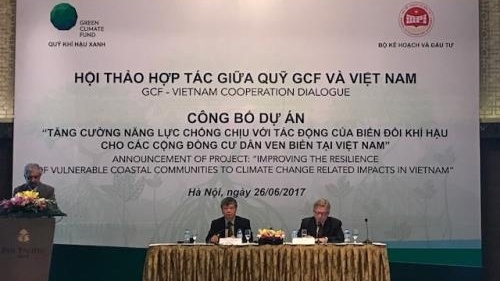The Ministry of Planning and Investment (MPI), the UN Development Programme (UNDP) and the Green Climate Fund (GCF) on June 26 announced a GCF-funded project to increase the resilience to climate change for coastal residents in Vietnam.

The US$ 29.5 million project, approved by the GCF in 2016, has been developed as a partnership between the UNDP, the Ministry of Agriculture and Rural Development, the Ministry of Construction, the MPI and coastal provinces. The project will focus on supporting communities vulnerable to natural disasters to protect themselves from the impacts of frequent typhoons and flooding, therefore improving their livelihoods. According to Deputy Minister of Planning and Investment, Nguyen The Phuong, Vietnam has an urgent need for investment to mitigate the impact of climate change, reduce risks and develop a low-carbon economy. The project is the first step in the long-term strategic partnership between Vietnam and the GCF, he stated, adding that the country also wants to contribute to the fund and share its experience with other GCF-supported countries. Kamal Malhotra, UN Resident Coordinator and UNDP Resident Representative in Vietnam, said that the UNDP is working with the Vietnamese Government on initiatives to strengthen the resilience to extreme climate phenomena for poor people in rural areas, many of whom are women and ethnic minorities. Maplecroft, a global risk and strategic consulting firm based in the UK, rates Vietnam as one of the 30 countries being at “extreme risk” of climate change within the next 30 years, in its Climate Change Vulnerability Index, which takes into account 42 socio-economic and environmental factors. During 1992-2012, natural disasters claimed the lives of 457 people, destroying over 96,000 houses, and causing losses equivalent to 1.3 percent of the GDP, each year. The rate of poor households accounts for 23 percent in coastal areas, two times higher than the average rate of the country, which is partly caused by natural disaster-related losses. Vice Chairman of the People’s Committee of the central coastal province of Thanh Hoa, Nguyen Duc Quyen said to cope with climate change, it is necessary to mobilize resources from the private sector in the form of public-private partnership, official development assistance (ODA) and with the aid of non-Governmental organisations. He also stressed the need for the Government to upgrade sea and river dykes, improve the early disaster warning system, support poor households in production and develop livelihood models adaptive to climate change. At the event, delegates also discussed Vietnam’s strategy to access the GCF, with the focus on the country’s strong commitments to climate change policy, investment in climate change adaptation and green growth and strengthening the strategic cooperation between Vietnam and the fund.
















